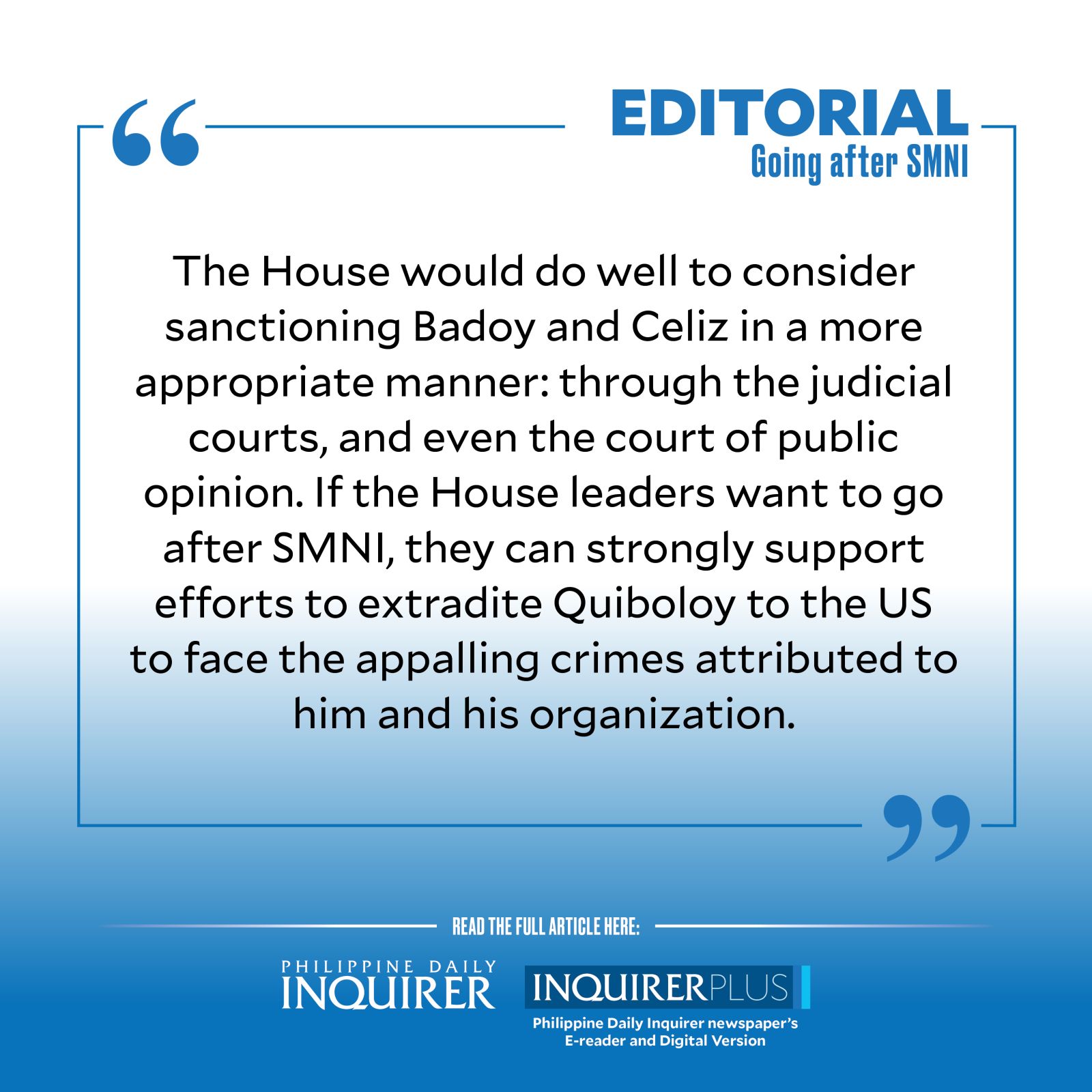
For making the claim—since debunked—that House Speaker Ferdinand Martin Romualdez cost taxpayers P1.8 billion a year in travel expenses, program anchors Jeffrey Celiz and Lorraine Badoy have put Sonshine Media Network International (SMNI) in the crosshairs of Congress, which is now seeking to revoke its franchise.
Under Republic Act No. 11422, which extended SMNI’s franchise for another 25 years, the network should “conform to the ethics of honest enterprise; and not use its stations or facilities … for the dissemination of deliberately false information or willful misrepresentation, to the detriment of the public interest,” noted Parañaque City Rep. Gustavo Tambunting of the House committee on legislative franchises at the start of its investigation on the matter last week.
PBA party list Rep. Margarita Nograles meanwhile filed a resolution calling on the National Telecommunications Commission (NTC) to suspend the operations of SMNI franchise holder Swara Sug Media Corp., “to immediately stop the deliberate dissemination of false information that may generate cynicism and mistrust on matters involving public interest.”
Risk of partisan politics
Well-intentioned to be sure, but one that merits deeper thought. While an exhaustive probe into SMNI’s seeming pattern of broadcasting misinformation and even hate speech and the unethical behavior of Celiz and Badoy is certainly warranted, the resolution raised concern among journalists and the legitimate media sector. As the National Union of Journalists of the Philippines (NUJP) pointed out, calling on the NTC to suspend SMNI’s operations in this instance “highlights the risk of partisan politics being embedded in regulatory and legal processes.”
SMNI, which is now also being used by former president Rodrigo Duterte to attack Congress after it scrapped P650 million in confidential funds for his daughter Vice President Sara Duterte, certainly cannot be lined up as among the legitimate media organizations that must be protected from attacks and policies curtailing press freedom. It gained its power from Duterte’s demonstrated support for his spiritual adviser, and campaign financier, Pastor Apollo Quiboloy, who is widely known to be the SMNI’s owner. The pastor has been linked to the sex trafficking of women and minors, crimes that landed him on the most wanted list of the United States’ Federal Bureau of Investigation.
Doing a Duterte
The irony is that the House, while going after these unrepentant Red-taggers, is at risk of doing a Duterte.
The NUJP recalled how under Duterte, who openly disdained mainstream media, the NTC blocked access to alternative news sites without due process and based only on a letter request from the National Security Council. In the same vein, Duterte and his allies mustered the weight of government and waged a relentless attack on and sought to cripple legitimate media outfits, including this paper and online news site Rappler, for being critical of a number of government policies, including the bloody war on drugs.
“Franchise proceedings were also used in Duterte’s vendetta against ABS-CBN, leading to [its] shutdown, whose effects are still felt by the media community years after,” the NUJP said.
With the political winds shifting, the move to suspend SMNI’s franchise now raises questions. Was it motivated by partisan politics rather than a genuine desire to sanction the spread of lies and misinformation? How else explain the silence of some House members under the previous administration when Badoy and Celiz were repeatedly called out for the same offenses? The Commission on Human Rights (CHR) even warned that such “sweeping political generalizations undermine human rights, reinforce inequalities, and introduce hostile divisions in Filipino society.” The CHR at that time reminded the government of its obligation to protect freedom of expression, opinion, and information.
Extradite Quiboloy
Its pleas were largely ignored, and the two Red-taggers continued to use their SMNI platform to paint government critics as communist symphatizers. Celiz and Badoy, the former spokesperson of the National Task Force to End Local Communist Armed Conflict were also shielded by Duterte’s support.
Aside from facing at least 11 complaints before the Supreme Court, the Office of the Ombudsman, and the Commission on Elections for her Red-tagging spree, Badoy—along with Celiz—are now detained by the House which found them in contempt for their conduct during the hearings. After accusing Congress of having been infiltrated by communists, Badoy joined Celiz on a hunger strike to protest the “travesty” of the House proceedings.
That may be too strong a word, but the House would do well to consider sanctioning Badoy and Celiz in a more appropriate manner: through the judicial courts, and even the court of public opinion. If the House leaders want to go after SMNI, they can strongly support efforts to extradite Quiboloy to the US to face the appalling crimes attributed to him and his organization.